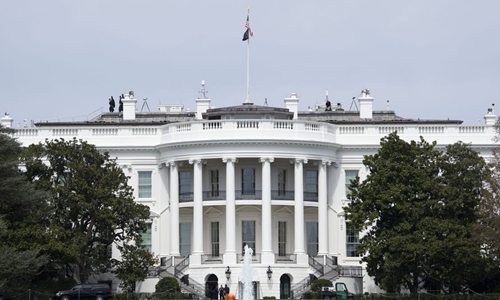US is overthrowing Washington Consensus
By Song Guoyou Source: Global Times Published: 2020/7/13 14:38:40

Photo taken on March 27, 2020 shows the White House in Washington D.C., the United States. Photo: Xinhua
The "Washington Consensus" has been one of the US' ideological cornerstones in the post-Cold War era's liberal international order. This political consensus has fostered economic policies that have had deleterious impacts on countries in Central and Eastern Europe, Latin America and other regions — all for the benefit of the US. Under the framework of the Washington Consensus, the market economy plays a fundamental role in eliminating trade barriers and reducing restrictions on investment. It gives international economic organizations important roles in promoting globalization.But it is clear that the Trump administration is not a supporter of the Washington Consensus. In fact, the distinct orientation of the Trump administration regarding international economic policy includes the following baffling stances: increasing US average tariffs, promoting stringent restrictions on foreign direct investment, withdrawing from international organizations, and challenging the process of globalization that Americans have fought tooth and nail to build, all of which are against the Washington Consensus.
The international community is fully aware that the US under Trump is deviating from the old Washington Consensus — and indeed is crippling it day by day and tweet by tweet.
The current pandemic sparked recession has further prompted Washington to set economic rescue plans and formulate policies that are inherently against the Washington Consensus. This is being done under the auspices of stimulating the economy. But it will damage the long-term stability of the global economic system.
More importantly, the US has greatly expanded the role of the government in economic operation. In fact, the US monetary authority issued a large amount of currency, which has led to an abnormal operation of its financial system. The Treasury faces massive deficits but must provide massive liquidity injections to calm markets. Washington is also taking advantage of the opportunity to fight the pandemic and avoid economic recession in order to advance certain policy agendas. These moves all deviate from the Washington Consensus with varying degrees.
What is clear is that Washington is relying Keynesian economic theory. This represents a revival of anti-Washington Consensus policies which includes increasing the government's borrowing to strengthen the ability to allocate resources. It also entails providing additional financial assistance to Americans and launching public projects to stabilize employment. The ploy is to enhance the long-term international competitiveness of the US, with a hypocritical deviation from what it forces others to do when it makes them swallow the Washington Consensus.
China should take note of this serious turn of US affairs and change of course. Why?
First, Washington defames China's economic system. Washington still takes ideology as the starting point in its competition with China. It labels the Chinese-style economy as "state capitalism", and tries to deepen institutional gaps between China and other developed economies.
However, as mentioned above, Washington under Trump is no longer a firm supporter of the core values of the so-called free market economy as the Washington Consensus dictates.
In the future, China for one must respond forcefully to attacks on its own ideological positions. Second, Washington has caused long-term, negative impacts on China's economic growth. This unfair competition against China stems from Trump's turn to economic nationalism and state subsidy policies. China needs to find countermeasures to avoid the impact of such US policies.
Third, Washington under Trump challenges the existing international economic order. Indeed, the Trump administration has shaken the relatively stable international economic structure formed during the past seven decades, and especially the past 20 years. Ironically, the US is now the biggest disruptor of the international order. It is leading the charge to disintegrate the existing economic order too. Practically speaking, China should not only try its best to maintain world order, but also be ready to deal with threats if the order changes or even collapses.
People need to be fully aware that the US is no longer the same country it used to be. The traditional Washington Consensus no longer exists as Trump sabotages it. The traditional order is on the verge of collapsing. The entire framework of international relations has become unstable. We must, from a broader historical prospective, respond to the strategic adjustment of the US in order to better safeguard the development and stability of our shared world.
The author is deputy director of Center for American Studies, Fudan University. opinion@globaltimes.com.cn
Posted in: VIEWPOINT